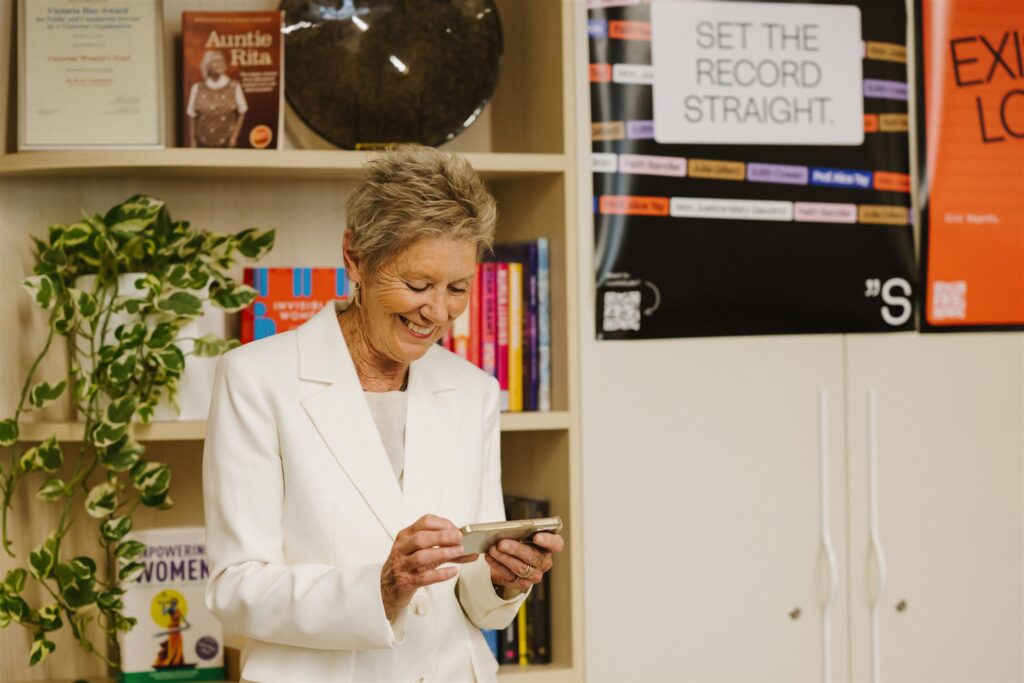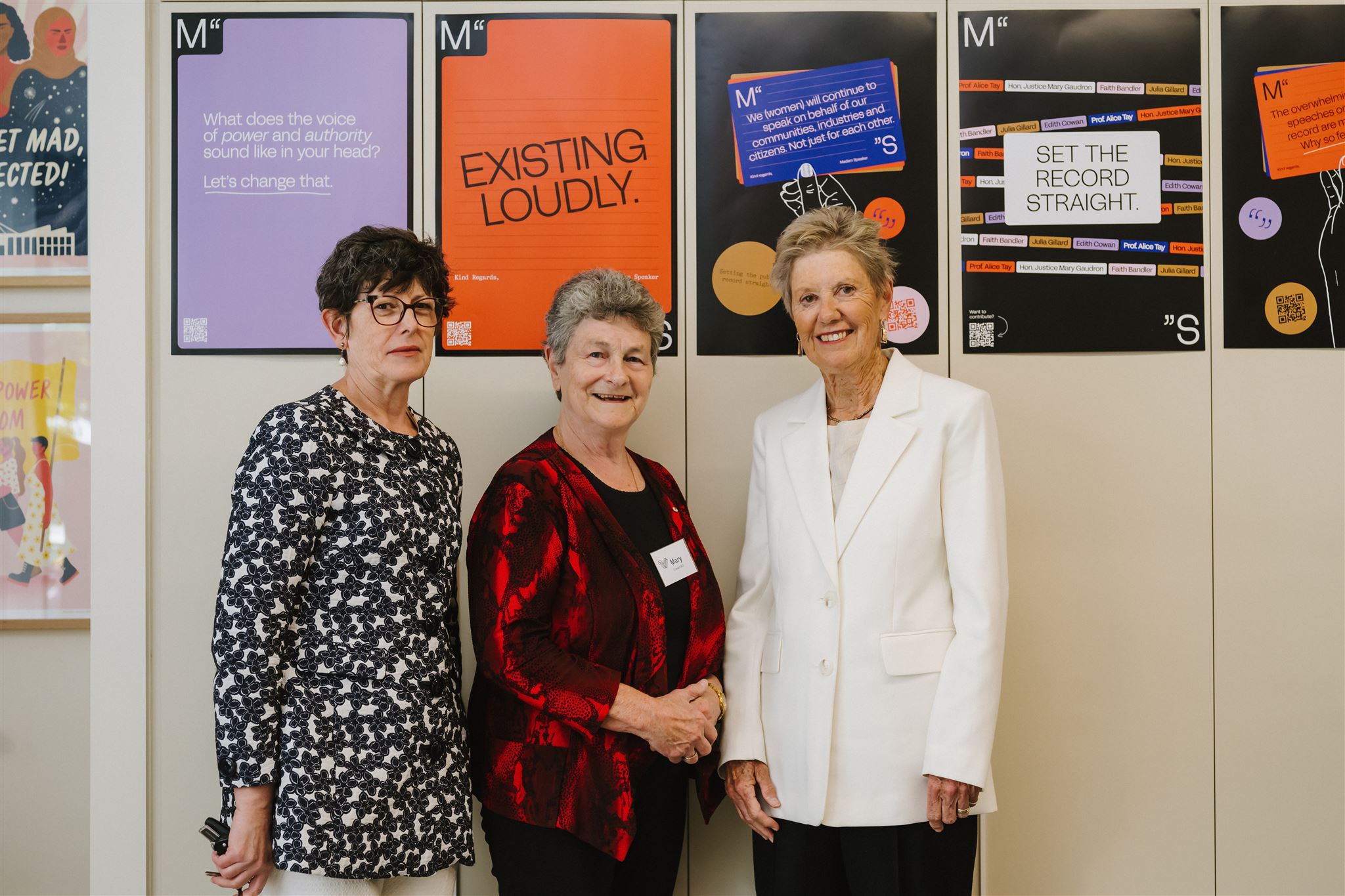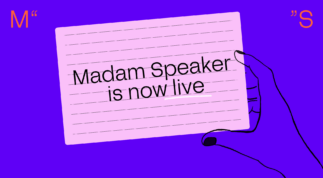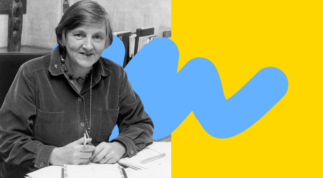Photo: (from left) Anna Burke, Mary Crooks AO, Diana Bryant AO KC by Breeana Dunbar
The following is a transcript of a speech delivered by Diana Bryant AO KC, Former Chief Justice of the Family Court of Australia, at the launch of Madam Speaker on 20 November 2024:
Thank you. It’s a really great pleasure and an honour for me to be invited tonight to launch this important initiative.
When Mary invited me to do it, I was immediately sympathetic at the project she was doing and giving, as she described it, giving a voice to women.
Imagine this, as we’ve heard, flipping through an anthology of great speeches, a collection that promises to showcase the most impactful words spoken throughout history. But as you turn the pages, there’s something missing; the voices of women.
In fact, if you could look at the most famous collections of speeches, you might find that women’s voices are hardly present.
In many Australian anthologies, again, as we’ve heard, women’s speeches are often relegated to margins, or worse, completely erased. But why is this? Why are the words of so many women left out of the conversation?
Let’s take a moment to look at some of the most well known anthologies of great speeches in Australia. Collections like Great Speeches of the 20th Century – All of the Australian Speeches include names like John Howard, Walt Whitman, Bob Hawke, all important figures in Australian history. But how many of us would be able to name even a handful of female speakers who had a similar impact?
To provide a concrete example, I pulled from my own bookshelves in the last couple of days two books of speeches. I’m a bit of a fan of speeches. The first was The Art of Great Speeches by Dennis Glover, an Australian. Clearly in its art form, as Mr. Glover sees it, few women have the skills he wants. Of 51 speeches, only three appear; Julia Gillard, not the misogyny speech, Pauline Hanson, her maiden speech, and Sarah Palin. It does make you a little concerned about his criteria.
The second is an international book with historical pretensions abounding. It starts with the Bible, incorporating Moses’ 10 Commandments and Jesus’ Sermon on the Mount. It concludes with George W Bush’s address to the nation on 9/11 and covers everything in between. Nevertheless, women seem to have fared a little better over time; of 48 speeches, 6 are by women.
And it’s not a bad cohort, if a bit thin; Elizabeth I, Emmaline Pankhurst, Marie Curie, Shirley Chisholm, and that we should absolutely celebrate, Golda Meir and Mother Teresa.
We take a deeper look at these anthologies, it’s not hard to see the pattern. Women’s voices are not only underrepresented, but they’re also often excluded entirely. The few women who do make an appearance are exceptions rather than the rule, and while the speeches of men like John Curtin or Malcolm Fraser are given entire chapters in books, the speeches of women are often condensed into footnotes or single paragraphs.
Now that I reflect on it, women have so often been excluded from the positions where their speeches might be taken seriously, and even where such positions have been held, their speeches are often overlooked.
Indigenous women have a double hurdle.
This pattern isn’t just an oversight, it’s a reflection of a broad historical trend; for centuries, women have been systematically denied platforms to speak in public, let alone to shape political discourse. When they did manage to speak, their words were often dismissed, distorted or ignored.
But despite this, many women found ways to challenge the status quo and speak up for change, and these voices deserve to be heard and recognized, and they should be in the perspective they provide.

Photo: Breeana Dunbar
In 2014 I was involved in the launch of a book called Australian Feminist Judgments, Writing and Rewriting the Law. In many different areas of law, significant judgments were rewritten by academics to reflect a feminist perspective, and unsurprisingly, to not only provide a much more nuanced narrative, but also a different result.
In the spirit of complete disclosure, I should add that a judgement I had authored was rewritten by feminist authors.
We can’t change the content of the anthologies to which I’ve referred, but we can now identify women’s speeches and place them in the digital world where current and future generations can readily access them.
That’s what is occurring with the launch of this online archive, which at present has 250 speeches, but promises many more, it seeks to rectify the silencing of women’s voices in the public space.
Trawling through the speeches is a delight, comparing the speeches of women following the end of World War One, where the presence of Australian women, important Australian women, I might add, on the world stage, was largely ignored here, to the more recent speeches of Catherine Branson and Justice Jayne Jagot about human rights.
I note the comments of Mary Gaudron on the establishment of the Australian women lawyers, and I count myself lucky that I’ve been at some of the occasions on which those features were delivered.
I hope you might think about including at least some of the speeches of Julie Bishop, which I came across recently, not political ones, but on the downing of MH 17, the Malaysian Airlines Flight, and particularly the speech she gave in relation to the responsibility of Putin for this to happen.
And if you listen to that speech, it’s something I doubt the impact would have been the same if a man had given the speech.
They were substantial and courageous and deserve recognition. I think for the benefit of this project, it’s incumbent on us all to report the speeches of women we hear and which deserve preservation and publication.
This will be an excellent resource for academics involved in women’s studies and for young women simply looking for words of inspiration from other women will, for the first time, be given a voice.
And of course, as we’ve heard, it’s important to have a say in the digital world with what’s going on. I congratulate the Victorian Women’s Trust and particularly Mary Crooks and Your Creative on this, this overdue and very important initiative.
And I have much pleasure launching it. Thank you.
Madam Speaker is a digital speech archive born from a collaboration between the Victorian Women’s Trust and Your Creative. We will correct the public record by platforming women’s vital contributions throughout Australian history. Help us grow the archive — nominate a speech today.



